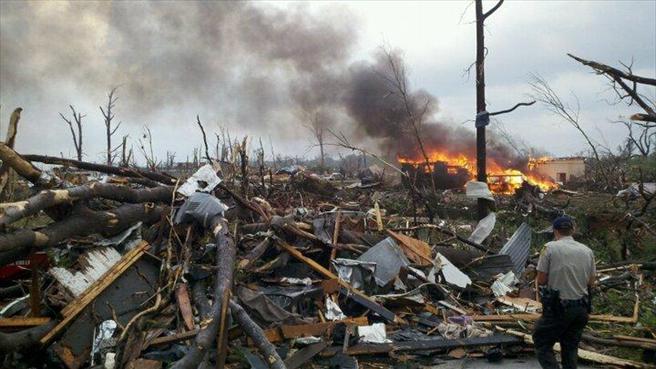Southern Stations Cover Tornadoes' 'Total Devastation'

The smarter way to stay on top of broadcasting and cable industry. Sign up below
You are now subscribed
Your newsletter sign-up was successful
The Alabama stations are scrambling to cover the devastation from Wednesday's tornadoes, which left at least 128 dead. The eye of the storm was Tuscaloosa, which is part of the Birmingham DMA.
Raycom's WBRC is a major news presence there, and Raycom--based in Montgomery--has four stations in the state. Its Huntsville station, WAFF, had its radar blown right off the tower Wednesday, says Raycom EVP-COO Wayne Daugherty. WAFF and WBRC remain live on Thursday, instructing people on where to seek shelter and how to stay safe after the storm.
Daugherty says Wednesday's devastation is unprecedented, at least from his perspective.
"I grew up in the state of Alabama," he says. "I've never witnessed anything like this. It's nasty. Nasty."
Station execs in the region echo Daugherty's account. I've never seen a storm that malevolent and that gigantic. It was scary," says Gene Kirkconnell, v.p. and general manager at WVTM. "It just stomped across Birmingham, flinging things around."
Raycom's stations are mostly clustered in the southeast, so the group used its Bitcentral system to share reportage related to the tornadoes among stations. "At times like this, you can go to the file and drag and drop stories," says Daugherty. "We have a terrific way to share stories, and our stations do it all the time."
Birmingham-Tuscaloosa's other outlets include Media General's WVTM, New Vision's WIAT, Allbritton's WBMA and Sinclair's WTTO-WABM. The stations' general managers, who worked on a joint cancer fundraiser in 2008, began communicating Thursday afternoon about another combined relief effort. "We're a lot more fortunate than other people in our viewing area," says Kirkconnell.
The smarter way to stay on top of broadcasting and cable industry. Sign up below
WBMA, for its part, is planning a two-hour telethon in prime Friday night, with funds going to the Red Cross, similar to what the station did following Hurricane Katrina. "We'll collect as much as we can," says Mike Murphy, president and general manager. "It's definitely one of those times you're so grateful it's not you, but you feel so bad for everybody."
On Tuesday night, tornadoes ripped through central Texas, prompting stations to go wall to wall with their coverage. "Every portion of the country has got their thing," says Bob Bunch, VP and GM at KWTX Waco. "Tornadoes seem to be ours."
Station reporters and camera crews frequently ended up as first-responders, pulling residents out of rubble. One Alabama report mentioned a neighborhood with 23 houses missing; another spoke of a woman huddled in her bathtub, then emerging after the tornado to see that the house around her was flattened.
"We'll continue to keep people informed and help them find the resources they need to put their lives back together," says Bill Ballard, president and general manager at WIAT Birmingham.
WIAT is covering the Tuscaloosa mayor's address live on Thursday. "We plan to do a lot of live television in the next few days," adds Ballard, "if not longer."
The affiliated networks and stations' sister outlets are arriving in Birmingham and Tuscaloosa. WVTM, for one, has Media General siblings out of Jackson, Mississippi, Columbus, Ohio and Mobile, among other markets, pitching in locally.
NAB President/CEO Gordon Smith saluted stations for their efforts to keep their communities informed. "In times of crisis, local broadcasters are a reliable first informer in providing emergency weather coverage that saves lives," he said. "Our thoughts are with those recovering from catastrophic tornadoes, and we applaud local TV and radio stations that are galvanizing relief efforts in grieving communities."
Lou Kirchen, v.p. and general manager at WBRC Birmingham, says it's all part of working at a TV station. "We'll be on until we feel like we need to take a breath," she says. "The storms have passed, but the stories have just begun."
Michael Malone is content director at B+C and Multichannel News. He joined B+C in 2005 and has covered network programming, including entertainment, news and sports on broadcast, cable and streaming; and local broadcast television, including writing the "Local News Close-Up" market profiles. He also hosted the podcasts "Busted Pilot" and "Series Business." His journalism has also appeared in The New York Times, The L.A. Times, The Boston Globe and New York magazine.

